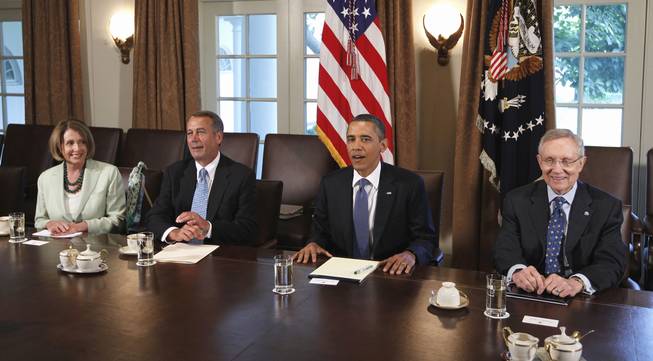
AP Photo/Charles Dharapak
President Barack Obama meets with Republican and Democratic leaders regarding the debt ceiling, Monday, July 11, 2011, in the Cabinet Room of the White House in Washington. From left are, House Minority Leader Nancy Pelosi, House Speaker John Boehner, the president and Senate Majority Leader Harry Reid.
Monday, July 11, 2011 | 10:36 p.m.
WASHINGTON - They haven’t necessarily made that much progress behind closed doors, but most of the principal negotiators in the debt limit talks did put their cards down in public Monday, starting with President Obama, who said he’s “prepared to take on significant heat from my party to get something done.”
What that means, of course, is that he’s willing to face the music from Democrats for his insistence that the debt deal tackle entitlement spending, namely, Medicare and Social Security -- the very programs Democrats had wanted to paint themselves as the great defenders of in 2012.
But if there’s heat to be had, it doesn’t look like it’ll be Harry Reid turning it up.
Reid has been saying for months that he would do everything in his power as majority leader to prevent anyone, Democrat or Republican, from tampering with Social Security.
But for all of that tough talk, he’s been noticeably quiet as the president shifts his position to the center, and assigns Reid and his House counterpart Nancy Pelosi the “lot of work” it will take “to bring Democrats along.”
Reid’s silence on the issues now being publicly debated by the principals in the negotiations is all the more noticeable because of what’s happening on the other side of the aisle, where House Speaker John Boehner and Republican Leader Eric Cantor were all but clamoring over each other Monday to tell the media how serious they are about their demand that tax hikes stay off the table -- and how much heat they’re willing to take, too.
“I don't think the White House understands how difficult it is for fiscal conservatives to say they are going to vote for a debt ceiling increase,” Cantor said at a meeting with reporters in the afternoon, explaining that for Republicans, the compulsion to keep taxes low was as sacrosanct as Democrats’ need to protect whatever budget emerges from changes to the health care law.
But deals require dealing -- as the president said, “if each side wants 100 percent ... then we can’t get anything done.” Reid appears to have taken that to heart.
Instead, if there’s to be serious Democratic opposition, it could coalesce around Senate Budget Chairman Kent Conrad, who on Monday some details of his plan to lower the debt by $4 trillion -- the same figure bargainers at the White House have been angling for.
Conrad, though he’s the chairman of the committee that’s supposed to control the budget, seems to have been largely ostracized from the process, telling reporters he hasn’t been consulted by the negotiators or the White House about the budget since Friday, well before talks began to run aground over the weekend.
He’s been working on the fiscal 2012 budget longer than anybody, convening a bipartisan “Group of Six” senators back in March to hash through points of potential discord -- but that group got largely pushed aside and forgotten when Vice President Joe Biden also collected six lawmakers from the House and Senate -- including Reid’s apparently more favored fiscal deputy, Sen. Max Baucus -- to have similar talks with a direct pipeline into the White House.
Conrad’s plan, when it was unveiled to lawmakers last week, produced a rather non-plussed reaction from Reid’s office, which indicated that the leader would be reviewing the plan -- though how quickly isn’t clear, given that two weeks before that, Reid had declared “it’s past time for gangs of five or six.”
There was a bit of dramatic irony to Conrad’s public unveiling Monday. His grand presentation on the Senate floor, replete with charts and pictures, was delivered at the same time as congressional leaders huddled with the president at the White House in the afternoon -- to an empty chamber.
Still, Conrad brushed off the suggestion that his plan would be rendered irrelevant by the timing, saying: “I don’t think it’s ever too late until the fat lady sings.”
Conrad’s plan would end tax breaks for those earning $1 million a year or more -- a much higher threshold than the president’s proposal -- make $800 billion in defense cuts, close several tax loopholes, lower the corporate tax rate to 29 percent, and make “modest” cuts to Medicare and Medicaid. But there are no changes to Social Security under his budget.
Whether or not Democrats prefer his proposal to what emerges from the White House negotiations though, Conrad is sounding a similar note as the president, who promised to veto any short-term, stop-gap measures Monday morning. “You’ve got to be in the 4 trillion range,” Conrad said, or he’d vote against the deal.


Join the Discussion:
Check this out for a full explanation of our conversion to the LiveFyre commenting system and instructions on how to sign up for an account.
Full comments policy